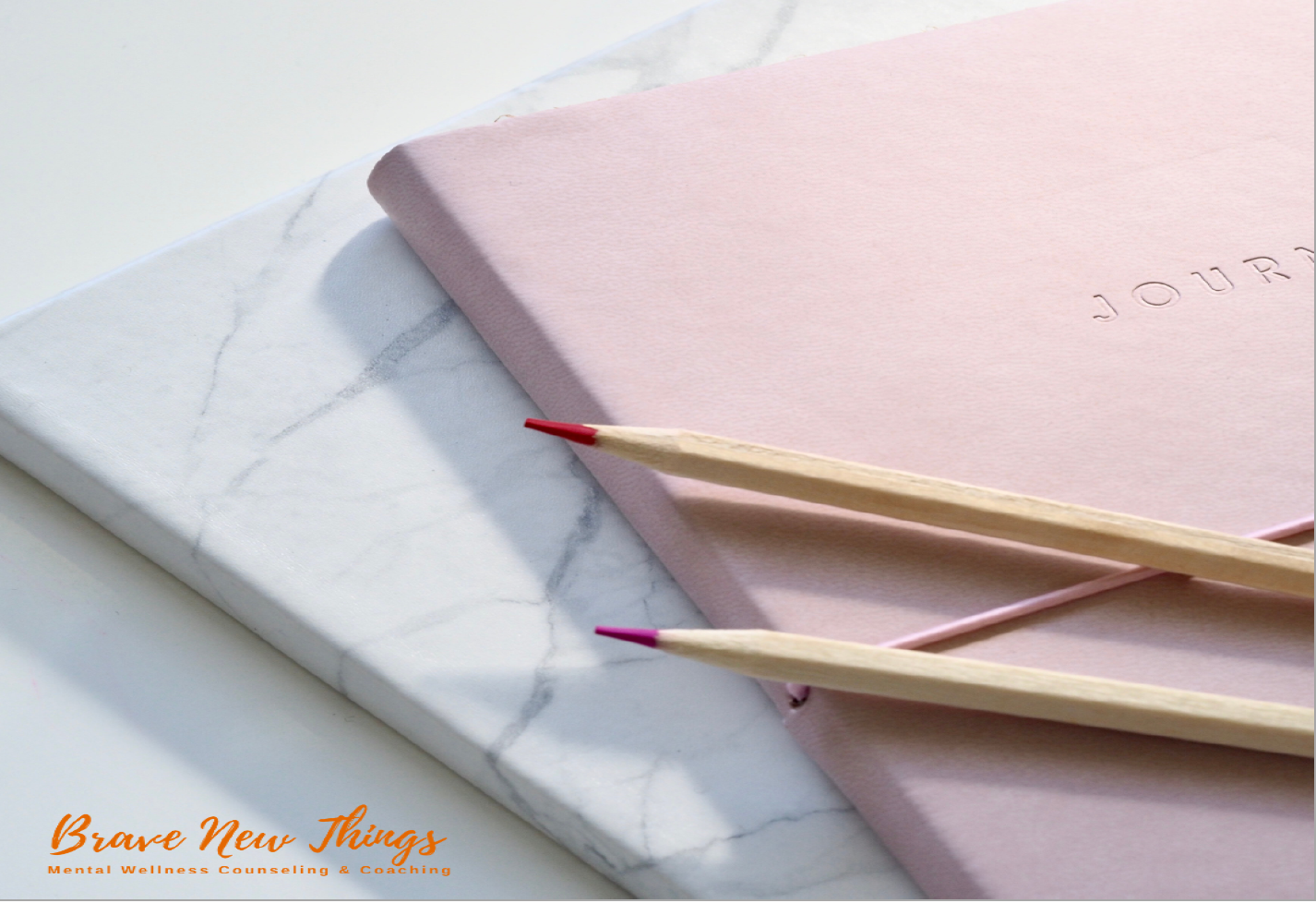Guest post by Joe Alvayero, Founder of Brave New Things Counseling
As we proceed into this unknown of 2021 and some of our old outlets (Social, Travel, Gyms etc) have been less feasible to accomplish, we are now further inclined to marinate in our emotions. This new world calls for a coping mechanism that challenges us to get outside these emotions. Another escape that has a cathartic effect. Allow me to introduce the world of journaling. A world full of autonomy. You can say anything, do anything whatever fits your mood to possibly gain a new perspective in the end. In this blog, I will introduce you to two popular types of journaling. As well as some long term benefits. My hope is to just get your wheels spinning to consider a stronger relationship with…. you.
Styles of Journaling
Free Write - Transition what is on the mind to paper
With this style of writing, you have the ability to record your thoughts and analyze what you do with them. “How do I behave when I feel sad or angry? What tends to be the trigger to these emotions?”. For example: normally at the end of the day we are filled with so much repressed experiences, in which we may need to process and learn from. This style has no rules, just pen and paper. LET IT FLOW!! What I encourage at the end, is to grab a highlighter and go find words/phrases that have been repeated over and over. This is a rare opportunity to get a glimpse into your self talk. Analyzing this smaller group of words. As the words are pulled together, you will start to see the recurring themes and patterns. Now, ask yourself: is there a common trigger? Are we creating unnecessary pressure on ourselves? How many times do we say “Shoulds, Never, Can’ts and Have to's….”. What I often ask of clients who can be hard on themselves is “what would you tell a friend?”. Initiating some empathy with you.
The Unsent Letter
There are times we have unresolved and/or lingering emotions towards someone that we cannot be expressed. For example - a loved one has passed away and is no longer physically accessible, or after a break-up and a person is no longer emotionally accessible. This style of writing gives us an opportunity towards some closure. “What did I always want to say?” “How can I get peace?”
Letter to the past self- Importantly enough, there are moments we need to work on self forgiveness and rebuild a relationship with ourselves. For example, part of the residual emotion after a toxic relationship (Which can be defined in many ways...see my blog) we develop a lack of trust in our judgement “How did I allow myself to get involved with this?” This style of journaling will allow us to write a letter to our past selves. “What did I want to hear back then?” “How can I reassure myself it will be okay?”. Self awareness can blossom with asking “what” questions listed in these examples.
Benefits of journaling
There are long lasting benefits to journaling which is a product of the ability to look back on a journal entry. Ask questions that could give you insight towards a long lasting and meaningful connection between your feelings and your behaviors. With practice you will have intel on what makes you sad, angry or even happy. You can now apply this information to your dialogue in a relationship. “I felt sad when..” This provides your partner a better understanding of your experience. When you are listening to others and hear an emotional word like “I feel sad/anxious” , there is an insight of what that feels like and now you are a stronger empath. In return, increasing your emotional connection.
Furthermore, we develop a tolerance level on managing emotions. When you are going through an uncomfortable emotion. Your brain turns on “I know what to do here!!”, allowing yourself to feel the emotions and letting it pass. Instead of finding a need to escape through substance use or any self sabotage behavior. Overall, many future health benefits to gain from, hence the better you.
How to begin the process (some pointers)
I recommend picking a day out of the week (maybe a known stressful day). Grab a pen and paper practice free write. Gain momentum and build off of that. At the end of the week when you are in a different state of mind, look back. Pick out some
words/phrases that stick out to you (as described earlier) pay attention. Within time journaling can be another item in your coping mechanism tool box. Keep up a routine regardless of what you are experiencing that day. Write even when you are feeling great, to remind yourself of this feeling when you're not. If you feel stuck, reach out to a professional to help push it along. Therapy is way more accessible than it used to be. Here's to the best you! Thank you for reading.
Joe Alvayero, LPC, is a Licensed Professional Counselor who specializes in helping families, couples, and individuals successfully reach their goals. He supports children, teens and adults whose lives are impacted by anxiety and depression, anger, a traumatic or stressful event, grief and loss, attention deficit/hyperactivity, and overwhelming stress. He is also experienced and passionate about coaching mental health skills and techniques for athletes as a Sports Psychology Consultant.

